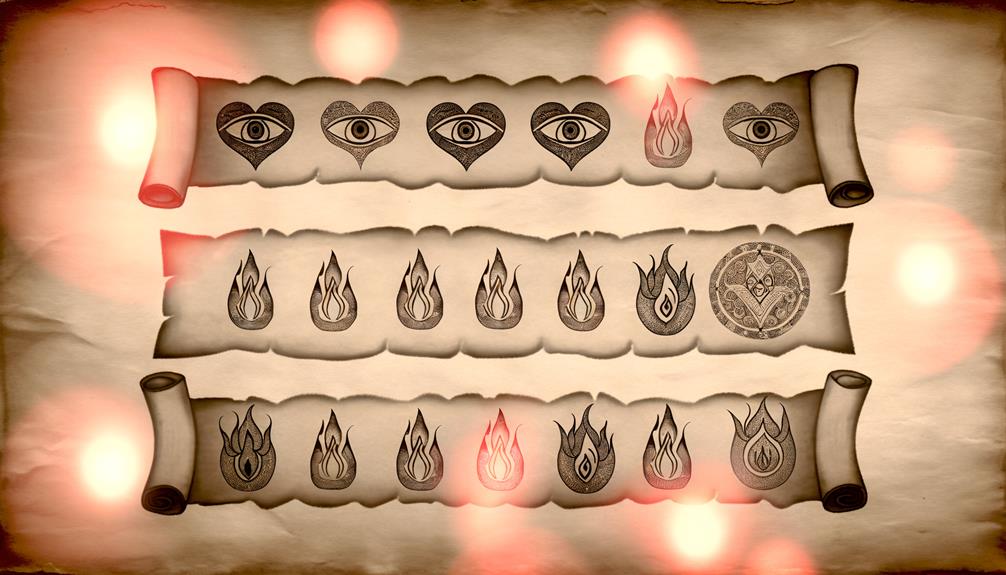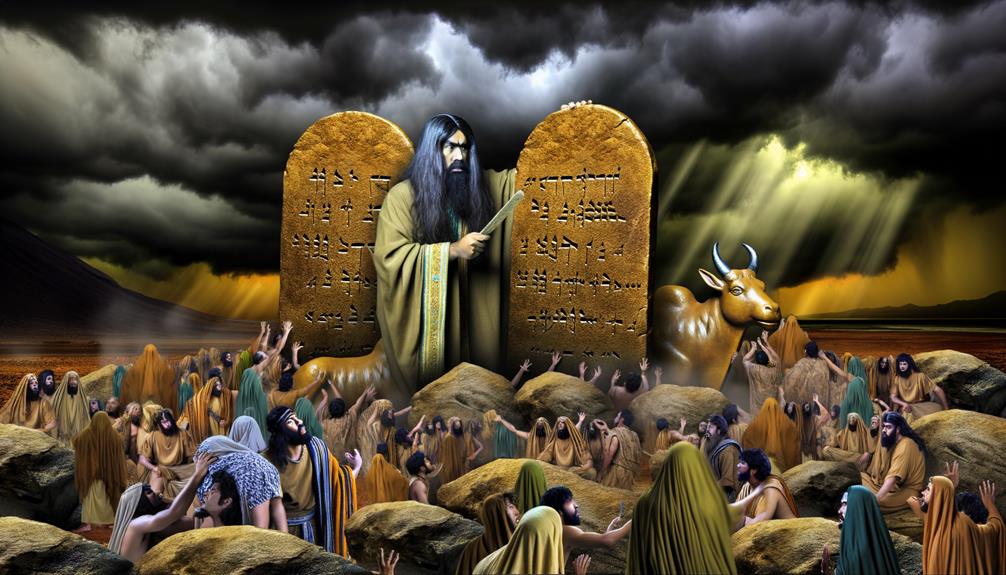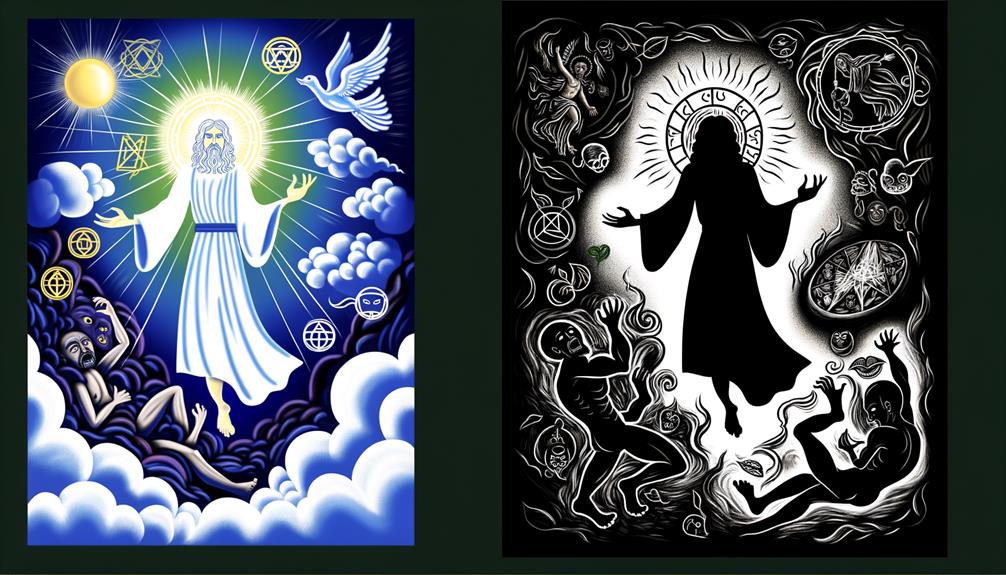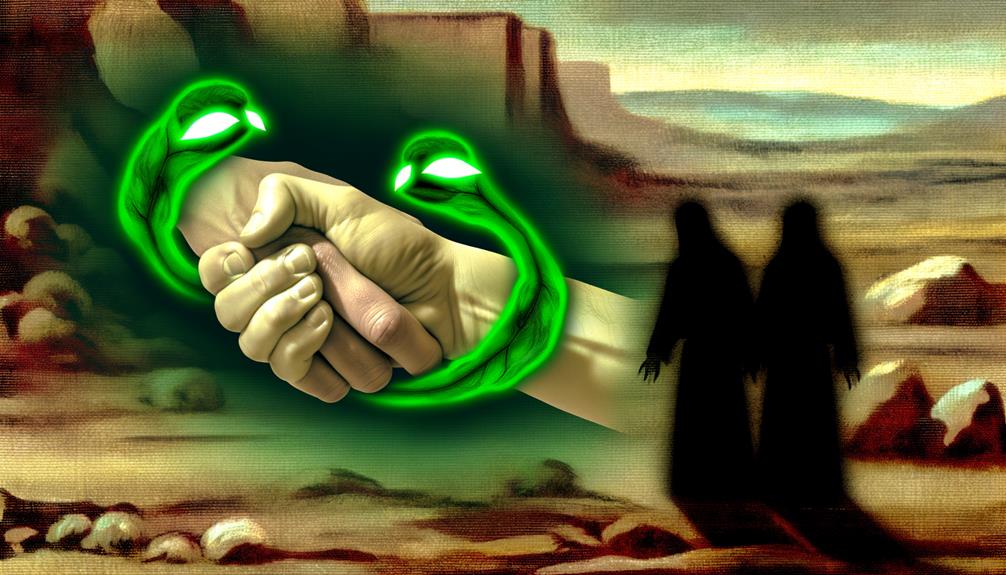Jealousy Meaning in the Bible: A Divine Perspective
In the Bible, jealousy holds a dual significance, encapsulating both divine and human aspects. Divine jealousy, as seen in Exodus 20:5 and Deuteronomy 4:24, underscores God’s exclusive covenant with Israel, necessitating undivided worship.
Conversely, human jealousy often leads to sin, as illustrated in the envy-driven narratives of Cain and Abel (Genesis 4:3-8) and Saul and David (1 Samuel 18:6-9). Theological insights draw a line between righteous and sinful jealousy, emphasizing its impact on community harmony and moral behavior.
By understanding these dimensions, one gains profound insights into the biblical portrayal of jealousy and its implications.

Jealousy Meaning in the Bible: Divine Emotion and Human Struggle
| Aspect | Details |
|---|---|
| Term | Jealousy |
| Biblical Context | Exodus 34:14 – “For the Lord… is a jealous God” |
| Divine Jealousy | God’s desire for exclusive worship and covenant faithfulness |
| Human Jealousy | Seen as a sin driven by envy and comparison (Galatians 5:20) |
| Spiritual Insight | Reflects the tension between righteous passion and sinful envy |
| Moral Teaching | Encourages contentment, trust in God, and self-examination |
Jealousy in the Old Testament

The concept of jealousy in the Old Scripture is often depicted as a divine attribute, where God is described as ‘a jealous God‘ in passages such as Exodus 20:5 and Deuteronomy 4:24.
This form of jealousy is not indicative of human envy but reflects God’s profound commitment to His covenant with Israel. Historically, this divine jealousy underscores the exclusivity of worship due to God alone, rejecting idolatry.
Theological insight reveals that this jealousy is protective, aiming to preserve the sanctity and purity of the relationship between God and His people.
Scriptural references consistently emphasize that God’s jealousy is a righteous zeal, ensuring that His chosen people remain faithful and undivided in their devotion, as seen in the prophetic literature and historical narratives.
God’s Jealous Nature

God’s jealous nature, as depicted in the Bible, serves as a profound demonstration of His unwavering commitment to maintaining an exclusive and sanctified relationship with His people.
Scriptural references, such as Exodus 34:14, where God is described as ‘a jealous God,’ indicate a divine intolerance for idolatry and unfaithfulness. This theological concept is rooted in the covenantal relationship established between God and Israel, emphasizing His desire for their undivided devotion (Deuteronomy 6:15).
Historically, this divine jealousy is not an expression of human pettiness, but a profound aspect of God’s holiness and righteousness. It underscores His authority and the sanctity of the covenant, ensuring that the people remain true to their unique identity and purpose as His chosen ones.
Jealousy Among Humans

The human experience of jealousy, as portrayed in the Bible, encompasses complex emotional and moral dimensions.
Scriptural narratives, such as the envy of Cain towards Abel (Genesis 4:3-8) and the rivalry between Saul and David (1 Samuel 18:6-9), illustrate how jealousy can lead to destructive outcomes.
These accounts offer poignant reflections on the consequences of unchecked jealousy and serve as timeless lessons on human nature.
Human Emotions and Jealousy
Examining human emotions through a biblical lens reveals that jealousy, often depicted in narratives such as Cain and Abel (Genesis 4:1-16), serves as a profound example of the moral and spiritual challenges individuals face.
This emotion, deeply rooted in human nature, manifests as a response to perceived threats or inequalities. Biblically, jealousy is not merely a personal failing but a spiritual trial that tests one’s faith and relationship with God.
Historical context shows that jealousy disrupts community harmony and leads to sin, as seen in Proverbs 14:30, which warns, ‘A tranquil heart gives life to the flesh, but envy makes the bones rot.’ Consequently, understanding jealousy within a biblical framework prompts a deeper reflection on moral integrity and spiritual growth.
Biblical Examples of Jealousy
Numerous biblical narratives illustrate human jealousy, such as the story of Joseph and his brothers (Genesis 37:1-28), where envy leads to betrayal and familial discord. Jealousy also manifests in Cain’s feelings toward Abel (Genesis 4:1-16), resulting in the first murder.
King Saul’s envy of David’s success (1 Samuel 18:6-9) further exemplifies the destructive power of jealousy. Finally, Rachel’s envy of Leah’s fertility (Genesis 30:1) reveals the deep emotional struggles within familial relationships.
| Biblical Figure | Manifestation of Jealousy |
|---|---|
| Joseph’s Brothers | Betrayal and Selling Joseph |
| Cain | Murder of Abel |
| King Saul | Hatred and Pursuit of David |
| Rachel | Envy of Leah’s Children |
These examples illustrate the pervasive and corrosive nature of jealousy in human interactions.
Righteous Vs. Sinful Jealousy

In the Bible, jealousy manifests in two distinct forms: the righteous jealousy of God, often depicted in His covenantal zeal for His people’s exclusive devotion, and the sinful jealousy that corrupts human relationships and leads to discord.
- Righteous Jealousy: God’s jealousy, as seen in Exodus 34:14, reflects His desire for undivided worship, safeguarding the sanctity of His relationship with Israel.
- Sinful Jealousy: Human jealousy, exemplified in stories like Cain and Abel (Genesis 4), results in destructive behavior and moral downfall.
- Historical Context: Ancient Near Eastern texts frequently feature divine jealousy, highlighting the expectation of fidelity in divine-human covenants.
Understanding these distinctions clarifies the moral and theological implications of jealousy in biblical teachings.
Jealousy in Relationships

Throughout the Bible, jealousy in relationships often serves as a cautionary tale, illustrating the destructive consequences of envy and mistrust, as seen in narratives such as Saul’s envy of David (1 Samuel 18:6-9). This jealousy erodes trust and fosters discord, diverging from the divine ideal of harmonious relationships.
Historical accounts like Rachel and Leah’s rivalry (Genesis 30:1-2) further emphasize that jealousy can lead to familial strife and spiritual decay. Such biblical themes underscore the need for cultivating contentment and trust through faith. Theologically, jealousy contradicts the essence of agape love, which is selfless and forgiving.
| Relationship | Scriptural Reference |
|---|---|
| Saul and David | 1 Samuel 18:6-9 |
| Rachel and Leah | Genesis 30:1-2 |
| Cain and Abel | Genesis 4:3-8 |
| Joseph’s Brothers | Genesis 37:11 |
Examples of Jealousy in Scripture

Biblical narratives offer profound insights into the destructive nature of jealousy, as exemplified by the story of Cain and Abel in Genesis 4:3-8. This narrative offers theological insight into how jealousy can lead to dire actions.
Similarly, Joseph’s brothers’ envy in Genesis 37:11 drives them to sell him into slavery. In 1 Samuel 18:6-9, King Saul’s jealousy of David’s popularity leads to repeated attempts on David’s life.
Three significant examples are:
- Cain and Abel (Genesis 4:3-8): Sibling rivalry fueled by divine favor.
- Joseph and His Brothers (Genesis 37:11): Envy leading to betrayal.
- Saul and David (1 Samuel 18:6-9): Jealousy resulting in royal paranoia.
These accounts underscore jealousy’s pervasive impact throughout biblical history.
Consequences of Jealousy

The Bible frequently illustrates the destructive emotional impact of jealousy, as seen in the story of Cain and Abel (Genesis 4:3-8), where jealousy leads to fratricide.
This negative emotion not only strains personal relationships but also disrupts communal harmony, exemplified by King Saul’s jealousy of David (1 Samuel 18:6-9), which resulted in prolonged conflict.
Historically, these examples underscore how unchecked jealousy can erode trust and foster discord within communities.
Destructive Emotional Impact
Often manifesting as a corrosive force, jealousy in the Bible is depicted as leading to destructive emotional impacts, as evidenced by the narratives of Cain and Abel, King Saul, and Joseph and his brothers.
Scriptural accounts provide vivid illustrations of jealousy’s ruinous effects on individuals and communities:
- Cain and Abel (Genesis 4:8): Cain’s jealousy leads to the first murder, illustrating the lethal potential of unchecked envy.
- King Saul (1 Samuel 18:8-9): Saul’s jealousy of David results in a deteriorating mental state and irrational behavior, showcasing emotional unraveling.
- Joseph and his brothers (Genesis 37:4): The brothers’ envy drives them to sell Joseph into slavery, highlighting the extent of familial discord jealousy can cause.
These stories underscore jealousy’s capacity for profound emotional damage.
Strained Relationships Outcomes
Scriptural narratives reveal that jealousy often culminates in strained relationships, as seen in the fractured bonds between Cain and Abel, King Saul and David, and Joseph and his brothers.
In Genesis 4:1-16, Cain’s jealousy towards Abel results in fratricide, leading to his exile and divine curse. Similarly, 1 Samuel 18-31 details how King Saul’s envy of David’s military success incites relentless pursuit, destabilizing his reign and causing familial discord. In Genesis 37, Joseph’s brothers, driven by jealousy, sell him into slavery, fracturing their familial unity.
These accounts illustrate jealousy’s destructive power, eroding trust and kinship. Theologically, these stories underscore the moral imperative to guard against jealousy, fostering instead love and humility to preserve relational harmony.
Overcoming Jealousy

Understanding the pathway to overcoming jealousy requires delving into biblical teachings that emphasize the transformation of the heart through divine grace and self-reflection.
The Bible provides a roadmap for overcoming jealousy by focusing on:
- Divine Love: Embracing the unconditional love of God as described in 1 Corinthians 13:4-7, which teaches that love does not envy.
- Self-Examination: Encouraging believers to examine their own hearts, as advised in Psalm 139:23-24, seeking God’s help in identifying and rectifying jealous tendencies.
- Contentment: Cultivating a spirit of contentment, as highlighted in Hebrews 13:5, understanding that God’s provision suffices.
Historically, these principles have been essential in guiding believers to transcend negative emotions and foster a spiritually fulfilling life.
Spiritual Lessons on Jealousy

Drawing from biblical narratives and teachings, spiritual lessons on jealousy illustrate the profound impact of this emotion on one’s relationship with God and others. The Bible recounts numerous instances where jealousy leads to sin, such as Cain’s envy of Abel (Genesis 4:3-8) and Saul’s jealousy of David (1 Samuel 18:6-9). These stories underscore how jealousy can corrode communal harmony and spiritual well-being.
| Biblical Figure | Jealousy Incident |
|---|---|
| Cain | Envy of Abel’s accepted offering |
| Saul | Jealousy of David’s popularity |
| Joseph’s Brothers | Envy of Joseph’s favored status |
| Pharisees | Envy of Jesus’ influence and following |
| King Herod | Jealousy of the prophecy regarding Jesus |
Understanding these lessons fosters spiritual growth, urging believers to seek contentment and trust in God’s plans.
Conclusion
Jealousy in the Bible manifests both as a divine attribute and a human flaw, revealing complex spiritual dynamics.
Significantly, Proverbs 14:30 states, ‘A heart at peace gives life to the body, but envy rots the bones,’ underscoring the destructive potential of jealousy.
Historical instances and scriptural teachings highlight the need for discernment between righteous and sinful jealousy.
Understanding these dimensions offers profound insights into human nature and divine expectations, encouraging spiritual growth and relational harmony.






